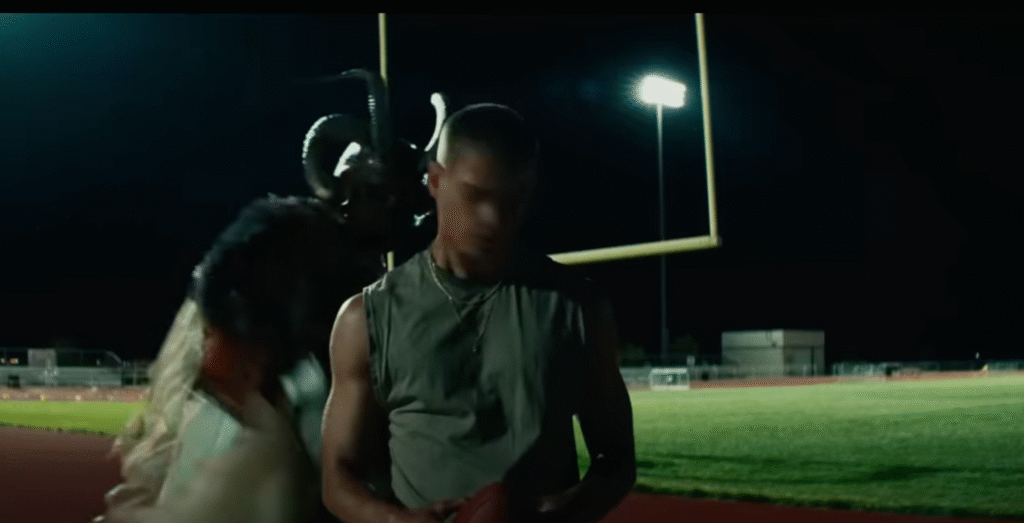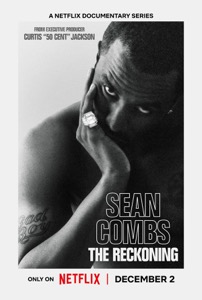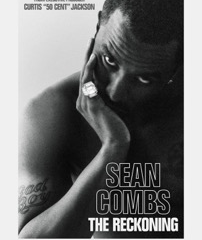Entertainment
Why HIM Movie Sparks Talk About Satanism and Occult Rituals

The 2025 horror film Him, produced by Jordan Peele and directed by Justin Tipping, has sparked significant discussion and controversy due to its prominent use of satanic and occult symbolism. Marlon Wayans stars as Isaiah White, a legendary but sinister quarterback who leads a secretive football cult where dark rituals and supernatural elements are central to the story.

The Occult and Satanism Themes at the Core of Him
The movie goes far beyond a traditional sports drama and plunges into horror by depicting an elite football mentorship that turns into a terrifying cult experience. Cameron Cade, a young quarterback injured early in his career, is invited to Isaiah White’s secluded compound to train. There, what seems like mentorship quickly reveals itself as indoctrination into a disturbing satanic cult.
One of the most striking symbols in the film is the pentagram combined with the infinity symbol that appears during a key scene where Cameron, blood-splattered, stands atop the symbol on the football field in a pose reminiscent of Christ’s crucifixion. This imagery blends themes of sacrifice, power, and eternity—tying the occult symbolism directly to the quest for greatness and the dark costs it entails.

As described in the teaser trailer breakdown:
“In the final shot, a blood-splattered Cameron stands on the field atop a sigil that combines a pentagram with the infinity symbol. He raises his arms in a Christ-like pose to form the I in ‘Him’.”
The pentagram here serves as a powerful symbol associated with satanism and occult practices, suggesting that the football cult is steeped in rituals that transcend the physical game and venture into supernatural terror.
Audience and Critical Reactions
The use of overt satanic imagery and occult symbolism like the pentagram has fascinated viewers and critics alike but also raised concerns. Some see it as a bold narrative choice adding depth and horror to the story, while others question the growing use of demonic and occult visuals in mainstream films.
One commentary notes:
“He’s stretching out like Jesus on the cross standing on top of a pentagram with, you know, blood depicted. What is this? Like, why is this happening in Hollywood? Why are people going more and more openly demonic with their direction?”

This is a reminder that the film’s horror is not just about external scares but about spiritual and psychological corruption as symbolized by the pentagram and other satanic imagery.
Social Commentary Behind the Horror
Him uses these occult motifs not just for shock but to critique the dark side of fame, power, and idol worship. The pentagram and cult rituals symbolize how the pursuit of excellence can consume individuals, turning mentorship into blind devotion and self-sacrifice.
The film asks viewers to consider:
“When the pursuit of greatness turns into blind devotion, the real horror lies in who we choose to follow.”
In Summary
Him is a unique blend of sports drama and horror, using satanic and occult rituals—especially the evocative pentagram symbolism—to explore themes of ambition, power, and corruption. Its unsettling depiction of a football cult infused with dark rituals has made it a standout horror film of 2025, sparking both fascination and debate over its use of these potent symbols and themes.

The film releases on September 19, 2025, inviting audiences to confront the terrifying price of greatness—and what it means to truly worship in the age of celebrity.
Entertainment
What We Can Learn Inside 50 Cent’s Explosive Diddy Documentary: 5 Reasons You Should Watch

50 Cent’s new Netflix docuseries about Sean “Diddy” Combs is more than a headline-grabbing exposé; it is a meticulous breakdown of how power, celebrity, and silence can collide in the entertainment industry.
Across its episodes, the series traces Diddy’s rise, the allegations that followed him for years, and the shocking footage and testimonies now forcing a wider cultural reckoning.

1. It Chronicles Diddy’s Rise and Fall – And How Power Warps Reality
The docuseries follows Combs from hitmaker and business icon to a figure facing serious criminal conviction and public disgrace, mapping out decades of influence, branding, and behind-the-scenes behavior. Watching that arc shows how money, fame, and industry relationships can shield someone from scrutiny and delay accountability, even as disturbing accusations accumulate.

2. Never-Before-Seen Footage Shows How Narratives Are Managed
Exclusive footage of Diddy in private settings and in the tense days around his legal troubles reveals how carefully celebrity narratives are shaped, even in crisis.
Viewers can learn to question polished statements and recognize that what looks spontaneous in public is often the result of strategy, damage control, and legal calculation.
3. Survivors’ Stories Highlight Patterns of Abuse and Silence
Interviews with alleged victims, former staff, and industry insiders describe patterns of control, fear, and emotional or physical harm that were long whispered about but rarely aired in this detail. Their stories underline how difficult it is to speak out against a powerful figure, teaching viewers why many survivors delay disclosure and why consistent patterns across multiple accounts matter.
4. 50 Cent’s Approach Shows Storytelling as a Tool for Accountability
As executive producer, 50 Cent uses his reputation and platform to push a project that leans into uncomfortable truths rather than protecting industry relationships. The series demonstrates how documentary storytelling can challenge established power structures, elevate marginalized voices, and pressure institutions to respond when traditional systems have failed.
5. The Cultural Backlash Reveals How Society Handles Celebrity Accountability
Reactions to the doc—ranging from people calling it necessary and brave to others dismissing it as a vendetta or smear campaign—expose how emotionally invested audiences can be in defending or condemning a famous figure. Watching that debate unfold helps viewers see how fandom, nostalgia, and bias influence who is believed, and why conversations about “cancel culture” often mask deeper questions about justice and who is considered too powerful to fall.
Entertainment
South Park’s Christmas Episode Delivers the Antichrist

A new Christmas-themed episode of South Park is scheduled to air with a central plot in which Satan is depicted as preparing for the birth of an Antichrist figure. The premise extends a season-long narrative arc that has involved Satan, Donald Trump, and apocalyptic rhetoric, positioning this holiday episode as a culmination of those storylines rather than a stand‑alone concept.
Episode premise and season context
According to published synopses and entertainment coverage, the episode frames the Antichrist as part of a fictional storyline that blends religious symbolism with commentary on politics, media, and cultural fear. This follows earlier Season 28 episodes that introduced ideas about Trump fathering an Antichrist child and tech billionaire Peter Thiel obsessing over prophecy and end‑times narratives. The Christmas setting is presented as a contrast to the darker themes, reflecting the series’ pattern of pairing holiday imagery with controversial subject matter.
Public and political reactions
Coverage notes that some figures connected to Donald Trump’s political orbit have criticized the season’s portrayal of Trump and his allies, describing the show as relying on shock tactics rather than substantive critique. Commentators highlight that these objections are directed more at the depiction of real political figures and the show’s tone than at the specific theology of the Antichrist storyline.
At the time of reporting, there have not been widely reported, detailed statements from major religious leaders focused solely on this Christmas episode, though religion-focused criticism of South Park in general has a long history.
Media and cultural commentary
Entertainment outlets such as The Hollywood Reporter, Entertainment Weekly, Forbes, Slate, and USA Today describe the Antichrist arc as part of South Park’s ongoing use of Trump-era and tech-world politics as material for satire.
Viewer guidance and content advisory
South Park is rated TV‑MA and is intended for adult audiences due to strong language, explicit themes, and frequent use of religious and political satire. Viewers who are sensitive to depictions of Satan, the Antichrist, or parodies involving real political figures may find this episode particularly objectionable, while others may view it as consistent with the show’s long‑running approach to controversial topics. As with previous episodes, individual responses are likely to vary widely, and the episode is best understood as part of an ongoing satirical series rather than a factual or theological statement.
Entertainment
Sydney Sweeney Finally Confronts the Plastic Surgery Rumors

Sydney Sweeney has decided she is finished watching strangers on the internet treat her face like a forensic project. After years of side‑by‑side screenshots, “then vs now” TikToks, and long comment threads wondering what work she has supposedly had done, the actor is now addressing the plastic surgery rumors directly—and using them to say something larger about how women are looked at in Hollywood and online.

Growing Up on Camera vs. “Before and After” Culture
Sweeney points out that people are often mistaking normal changes for procedures: she grew up on camera, her roles now come with big‑budget glam teams, and her body has shifted as she has trained, aged, and worked nonstop. Yet every new red‑carpet photo gets folded into a narrative that assumes surgeons, not time, are responsible. Rather than walking through a checklist of what is “real,” she emphasizes how bizarre it is that internet detectives comb through pores, noses, and jawlines as if they are owed an explanation for every contour of a woman’s face.
The Real Problem Isn’t Her Face
By speaking up, Sweeney is redirecting the conversation away from her features and toward the culture that obsesses over them.
She argues that the real issue isn’t whether an actress has had work done, but why audiences feel so entitled to dissect her body as public property in the first place.
For her, the constant speculation is less about curiosity and more about control—another way to tell women what they should look like and punish them when they do not fit. In calling out that dynamic, Sweeney isn’t just defending herself; she is forcing fans and followers to ask why tearing apart someone else’s appearance has become such a popular form of entertainment.



























